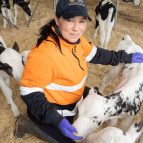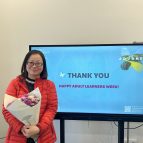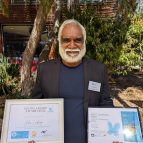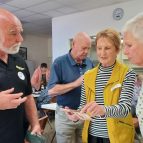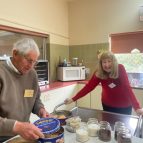Life after Holden
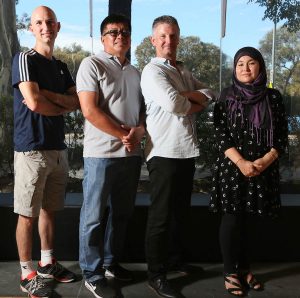
A digital skills certification program is offering former Holden workers and others affected by the Adelaide plant’s closure a digital edge when it comes to finding work.
When the gates shut on the Holden site in Elizabeth South Australia in October 2017, workers and businesses supplying parts and services to the company also felt the impact.
‘Our community was hit hard too,’ says Jo Cooper, Manager Community Capacity & Learning at the City of Salisbury, in the neighbouring suburb in Adelaide’s north.
‘Many of those exiting the automotive sector were men aged 40 plus who had low levels of digital literacy. We knew we needed a strategy to create learning pathways to support these workers to go on to further education and/or employment.’
But a training program that aimed to help people along the path to a new career or further study had to tackle the issue of digital literacy head on, as South Australia has the lowest digital literacy rate in Australia after Tasmania, recent data from Telstra’s Digital Inclusion Index shows.
‘We realised it was vital to link our community to the new employment opportunities arising within Defence and other growth industries and one of the critical skills required is digital literacy,’ Jo says. The City of Salisbury library service was well placed to offer training. As part of a statewide effort to improve digital literacy, the City’s library service has qualified trainers on staff and has invested in computers, laptops and the latest software for its community.
Free Microsoft courses
‘Our research found that digital literacy was a big issue in our community. We’re talking about people who have no wifi at home, and little access to desktop computers. Because of a combination of their age and the kind of work they had been doing, many people we engaged with did not know the basics of how to upload documents, use databases, and in some cases were not confident to work a mouse.’
A partnership between Microsoft Australia, the Department of State Development, Prodigy Learning and the City of Salisbury delivered a solution – a pilot program offering a suite of Microsoft Office certified courses usually worth hundreds of dollars for free through the local library to give automotive workers a digital edge in applying for jobs.
The first pilot began in February with training, certifications and a two-day career path workshop delivered by Prodigy Learning, a global training partner of Microsoft who worked closely with the City of Salisbury to tailor the pilot for local needs and train local staff to deliver ongoing training and manage the IT required.
‘Prodigy Learning was great to work with,’ Jo says. ‘They have done quite a bit of work in places where there’s been a downturn in industry including with blue collar workers in Ireland. They worked hard with us to understand the particular content and make sure the context was right so that it provided participants with the knowledge and skills required for future employment pathways.’ The result is a model that incorporates multiple levels of training in a mixed mode format.
Levels of certification
 The first step for people interested in the program is to undertake their own skills analysis – at the library or at home using GMetrix testing to establish what their skill levels are. The entry-level qualification is a Digital Literacy Certificate, which teaches people computer basics. Local adult and community education (ACE) programs play an important role in the learning continuum. If participants are struggling with the basic level certificate they are referred back to ACE to get one-on-one support to build their knowledge and confidence and then re-enter the pilot. Once they have finished they can also enter into ACE employment pathway programs to build their skills for finding work.
The first step for people interested in the program is to undertake their own skills analysis – at the library or at home using GMetrix testing to establish what their skill levels are. The entry-level qualification is a Digital Literacy Certificate, which teaches people computer basics. Local adult and community education (ACE) programs play an important role in the learning continuum. If participants are struggling with the basic level certificate they are referred back to ACE to get one-on-one support to build their knowledge and confidence and then re-enter the pilot. Once they have finished they can also enter into ACE employment pathway programs to build their skills for finding work.
After they have completed the Certificate, the participants can proceed to the next rung of the certification ladder, the Microsoft Office Specialist program which teaches people how to use core products that employers expect people in admin to be able to use in day to day work. ‘As a result of this training, participants are able to feel more confident doing basic and intermediate tasks including using Word, Excel spreadsheets and PowerPoint.
‘We start most people at the entry level, however, we are flexible with entry points depending on the skill level of the learner. We help them become familiar with the software until it feels natural for them and we build it from there. We interpret digital literacy as also including the use of social media so we show them how to use LinkedIn, which fits neatly into the job hunting process,’ Jo says.
A lot of people already experienced in Office want to do the Specialist training.
‘It’s a modular system where they complete it onsite and at home including homework. If they don’t have a computer at home, they can come to the library to use the computers there and there’s staff on hand to help.’
Offering training to the broader community
Interest in the free training has been strong and the City of Salisbury have opened it up not just to automotive workers and their partners but when space allows, to the broader community as well. Feedback has been very positive and over 215 people have signed up for training so far. The training runs at the Len Beadell Library with groups of 20 participants at a time.
‘One unexpected but great benefit from our point of view is that it brings people into libraries who wouldn’t normally use libraries. More and more employment based programs happen in our libraries and this is all part of the South Australia’s Public Library Services’ plan to transition libraries from being more than ‘just books’ to innovative learning hubs for the whole community. We are currently working with them to discuss the possible rollout of this program across identified libraries right across the State.’
First graduates
Holden Worker Brian Weste was one of the course’s early participants. ‘I signed up for the program as a result of going to the transformation centre at Holden. I saw a bit of the spiel done by them and I thought, you know what, it’s something I hadn’t considered. But I thought digital literacy for me is very basic, and it would be a good way of expanding on that. It’s the way of the future for me I hope.’ Brian has since found a new job as a mechanical maintenance fitter.
Lailoma Shahdoost, 38, took time out from work when she had her daughter six years ago. Since then she’s applied for a number of jobs with no success. ‘I felt discouraged. Having kids you feel like it kills your brain. When I heard about this course I wanted to go back and test my ability.’
With no Internet at home and no computer Lailoma’s digital literacy skills were very out of date. ‘For six years I hadn’t touched a computer. When I told them in class I trained in XP everyone laughed because no one even knows what that is anymore.
‘When it came to the first exam I was very very worried. You have to achieve a minimum of 75/100 in 50 minutes and do 7 projects in that time. But I did well.
‘What I loved about it was getting out of the house. I treated it like a job and it’s the best opportunity I’ve had so far. I am really grateful for that. I love learning. I say even if you don’t use it for work, you can use what you learn to help your children and your community. Everything is computerised these days, you can use it for banking, for paying bills and registration, for filling in forms. I really encourage them because it’s such a valuable opportunity.’
What’s next? ‘I would love to finish the whole thing, the Expert level and then the Masters. I’m really excited at the idea of doing that.’
See the full issue of Quest 1, 2018

